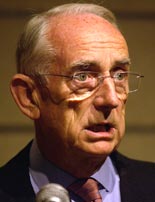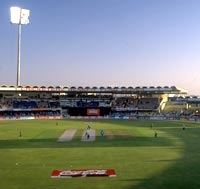Home > Cricket > Report
'Racism not about East-West divide'
Faisal Shariff |
June 30, 2003 22:16 IST
 Former International Cricket Council president Malcolm Gray is deeply concerned about the existence of racism in world cricket.
Former International Cricket Council president Malcolm Gray is deeply concerned about the existence of racism in world cricket.
Speaking to rediff.com on Monday morning, the 63-year-old administrator said that when he realised the extent to which racism had spread in the game, he understood where the stumbling blocks in decision-making lay.
"Right from the player level to the decision-making level, racism exists," he said. "Just the way racism exists in all societies and in every sport."
Admitting his failure to change the trend, Gray said: "There is very little I can do to change attitudes. But the ICC and I made decisions which were independent and not influenced by colours."
Without pointing to any particular example, Gray said, "Racism isn't about the east-west divide. There is brown versus black, there is black versus white, and there is white versus white. It is terrible to think that it is always white against the black or brown."
Discussing the decision to penalise England for not playing in Zimbabwe during the World Cup in southern Africa this year, Gray said he took the decision as a sports administrator, to uphold the game and honour its commitments.
"A by-product of that was that a lot of publicity was given to Zimbabwe and the corrupt regime in Zimbabwe was highlighted. This could only have assisted the people of Zimbabwe."
Excess money
Gray emphasized the growing danger of cricket struggling to handle large amounts of money. "All sports suffer from this problem. In the last decade the amount of money being pumped into the sport has grown exponentially. And I believe that at times the sport has not been well-equipped to handle it.
"All of a sudden when huge amounts of money pour in, things can go wrong. We live in an age of booms and busts."
Citing the example of information technology, Gray felt that cricket is unable to properly handle its commercial interests. He, however, stressed that the $550 million deal with the Global Cricket Corporation for cricket rights till 2007 is not an example of the huge amount he is referring to.
Match-fixing
Working hard to weed out corruption in cricket was one of the few feathers in Gray's cap during his stint as ICC president. "I would rather not have the cap at all," he joked.
In an interview to The Melbourne Age, Gray had hinted that some cricket boards had tried to protect their national heroes in the match-fixing scandal, as a result of which not many culprits were caught. "That might be harsh to say the least," he replied, when queried about the statement.
"I think at times the boards were tardy in their actions, slow at times, and failed to be a bit tougher on their players. But the boards did a great job without singling anyone out.
"It is a natural reaction for the board to save a great player; simple human nature."
Sharjah
 On March 24, Gray had dismissed charges of alleged corruption involving current West Indies skipper Brian Lara, former Pakistani captain Asif Iqbal, and the annual tournament in Sharjah.
On March 24, Gray had dismissed charges of alleged corruption involving current West Indies skipper Brian Lara, former Pakistani captain Asif Iqbal, and the annual tournament in Sharjah.
At that time, he had said, "In most of the cases, we cannot even take matters any further. If we did, it would cost us huge amounts of money and we wouldn't have got much further. My attitude towards Sharjah changed."
Cricketers Benevolent Fund Series chief Abdur Rehman Bukhatir, who brought cricket to Sharjah, had at that time expressed relief, saying that Sharjah was always clear of all charges.
Looking back on his statement, Gray said, "We were greatly concerned with Sharjah. Sharjah did react strongly in cleaning up. My attitude towards Sharjah changed. In the end, the entire environment of Sharjah was altered."
Australian dominance
Though an Australian himself, Gray has been critical of Australia's continuing dominance of the game, saying the Aussies were living in a fool's paradise.
He had stated in an interview to The Australian that the Australian Cricket Board would need to understand quickly the international problems caused by their dominance and warned that fans would also get tired of the team's success.
"My statement was misunderstood," he said today. "I meant that for cricket to thrive, the competition needs to be even."